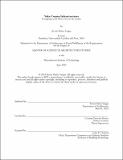Yaku Cosmo-Infrastructures : Designing with Water Across the Andes
Author(s)
Malca Vargas, Kevin
DownloadThesis PDF (109.0Mb)
Advisor
Parreño Alonso, Cristina
Terms of use
Metadata
Show full item recordAbstract
Water in the Andes is a dual entity: matter and energy, terrestial and celestial, substance, and Cosmos. This thesis is a provocation to reimagine water infrastructures across the Andes as a collaboration of ancestral and modern forms of relating with Water.
As an Andean descendant, my mother taught me that Water is a living being. A series of walks during the summer of 2023, visiting ancestral places, learning from Water nurturers, and participating in the water festival in the South of Peru allowed me to reconnect with my family knowledge. Marcela Machaca, a “Water Nurturer”, taught me that the Andean cosmology considers Yaku (Water in Qechua) to be a person. Yaku Mama (Mother Water) creates life in the Andes through a reciprocal nurturing relationship with the communities.
In contrast, modern epistemologies frame Water as a resource managed through infrastructures that extract, store, and distribute it across places. This approach disregards the Andean communities’ ancestral practices, disrupting the local ecological cycles. In the Quispillacta community, the duality of Water is evident, as they are both a resource managed by a dam and a living entity nurtured through ancestral practices. The incoming infrastructure planned by the government in Quispillacta raises an opportunity to embrace this duality by asking, how can we address the need for water access while also embracing the ancestral practices of living with Water?
An paradigmatic shift in water infrastructurtes is necessary. This thesis argues for an alternative way to represent, design, and live with Water in the Andes. It proposes Cosmo-infrastructures as a new architectural paradigm that embraces the collaboration of ancestral and modern ways of interacting with Water. By proposing the design of a seasonal learning path in Quispillacta, this thesis articulates stations that mediate, interchange, and regenerate Water in collaboration with the local ecology. This project invites us to think Water as a pluriverse, co-creating with other modes of relating to the world that challenge the canonic binary divisions between Water and land, architecture and landscape, and, most importantly, humans and nature.
Date issued
2023-06Department
Massachusetts Institute of Technology. Department of ArchitecturePublisher
Massachusetts Institute of Technology